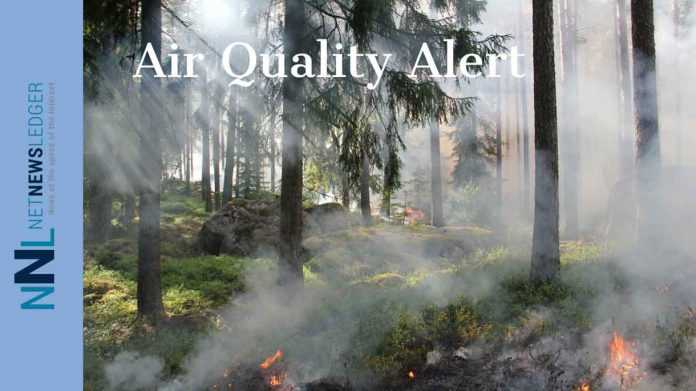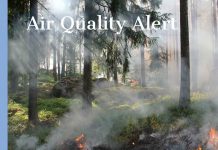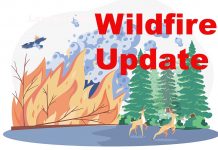KENORA – NEWS – A significant increase in air pollution is anticipated tonight as a result of smoke from forest fires in Alberta. The smoke plumes, carried by prevailing winds, are projected to move over Ontario, potentially impacting various areas of the province. If the smoke descends to ground level, air quality is expected to deteriorate.
It is essential to acknowledge that even at low concentrations, wildfire smoke can pose health risks to individuals. Taking proactive measures to minimize exposure is advised for everyone.
Individuals with pre-existing lung or heart conditions, older adults, children, pregnant individuals, and those who work outdoors are particularly susceptible to adverse health effects resulting from wildfire smoke. It is advisable to consult with your healthcare provider regarding the development of a management plan for wildfire smoke events. Additionally, ensuring an adequate supply of necessary medications at home and carrying them during the wildfire season is highly recommended.
Should you experience discomfort or if breathing becomes difficult, it is advisable to reduce or cease physical activity. If severe symptoms arise or if you require medical advice, please promptly contact your healthcare provider or local health authority.
Monitoring your symptoms and checking the Air Quality Health Index (AQHI) are crucial steps in responding to wildfire smoke. It is important to note that individuals may react differently to smoke exposure, with mild irritation and discomfort being common but usually subsiding once the smoke dissipates. Staying hydrated by consuming ample water can assist your body in coping with the effects of smoke.
For those with HVAC systems in their homes, utilizing the highest-rated MERV filter suitable for the system (preferably rated 13 or higher) and maintaining continuous air recirculation is advised. Alternatively, employing a portable High Efficiency Particulate Air (HEPA) air cleaner can also be beneficial. It is recommended to keep doors and windows closed if the indoor temperature is comfortable.
Seeking refuge in areas within your community where clean and cool air is accessible is a prudent measure to mitigate exposure to smoke.
In instances where outdoor activity cannot be avoided, utilizing a properly fitted respirator-type mask (such as a NIOSH certified N95 or an equivalent respirator) can help reduce exposure to the fine particles present in smoke. However, it is important to note that respirators do not mitigate exposure to the gases found in wildfire smoke. Listening to your body and adjusting or halting activities if symptoms occur is essential.
Please remember to check on individuals under your care and those around you who may be more vulnerable to the effects of smoke.
Reducing sources of indoor air pollution is crucial. If feasible, refrain from smoking or vaping indoors, burning incense and candles, frying foods, using wood stoves, and vacuuming during episodes of pollution. Removing dust from indoor surfaces through wiping and wet mopping is recommended.
If you are experiencing feelings of stress, anxiety, or depression, we encourage you to seek guidance from your mental health care provider or visit https://www.wellnesstogether.ca/en-CA.
For information on minimizing health risks and personal contributions to pollution levels, as well as current and forecast AQHI values, please visit www.airhealth.ca.






